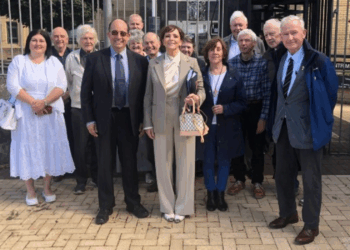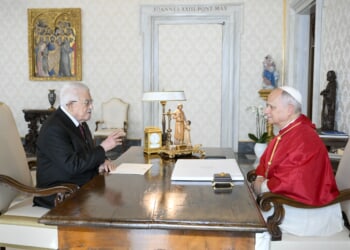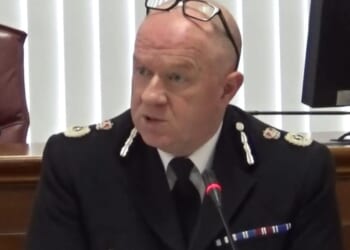I just finished teaching Viktor Frankl’s masterpiece, Man’s Search for Meaning. A day later, Charlie Kirk was assassinated on a college campus, much like the one that I teach at. Charlie Kirk and those like him have been repeatedly portrayed as fascists and Neo-Nazis, though they are neither. However, since this premise has been used to justify and celebrate his assassination, I offer the lessons of a man who survived Nazism and the death camps as therepeia — a healing — for my damaged country.
Frankl’s lesson is clear, biology is not what drives human existence, meaning is.
In the final pages of Man’s Search for Meaning, Frankl recounts the story of walking with a friend of his after they were liberated from Auschwitz. Walking arm in arm, his friend pulled him through a field of green crops. Frankl, for his part, managed to stammer something about not crushing the crops, which sent his friend flying into a rage. “You don’t say!,” raged the friend, “And hasn’t enough been taken from us? My wife and child have been gassed … and you would forbid me to tread on a few stalks of oats.”
The words strike at the heart, for being wrongly imprisoned, tortured, and losing a spouse and child are all horrible things that can befall a human being. I imagine they struck Frankl in such a way, which makes what he said next almost unbelievable.
Only slowly could these men be guided to the commonplace truth that no one has the right to do wrong, not even if wrong has been done to them. We had to strive to lead them back to this truth, or the consequences would have been worse than the loss of a few thousand stalks of oats.
Let that sink in. Frankl claimed the idea that no one has the right to do wrong, even those who have had wrong done to them, was commonplace. Yet as I watch the videos of people celebrating Kirk’s murder and listen to people calling him horrible names, I cannot help but conclude that what was once commonplace is no longer common. To watch and read these reactions is to glimpse the face of the lost and morally destitute man from Frankl’s story.
I see the fury of one who feels they have been victimized for no reason and who concludes, wrongly, that this justifies his conduct in destroying that which belongs to his neighbor. I see the inhumane treatment of a thing was enough to prompt correction from a survivor of one of the world’s human atrocities — the Holocaust — and I am left to wonder what Frankl would say if he were alive to see the reaction to Kirk’s murder.
I think Frankl would remind us of three things.
First, Frankl would say that there is no absolute metric that we can use to measure suffering. Frankl describes suffering like a gas, it fills the entirety of the space where it has been unleashed. For those of us who have listened to truly depressed people, we well know that depression and despair seep into every corner of the soul. If suffering saturates man’s inner world, it follows that suffering cannot be compared in a meaningful way. If one thinks back to the times they have compared their suffering to another’s, one cannot escape the conclusion that we only compare our suffering to another’s when we wish to belittle either them or ourselves.
Second, Frankl would likely tell us how he and his fellow prisoners could tell who would die next with frightening accuracy. It was not physical hardiness that kept people alive, it was the meaning they found in bearing their (pointless) suffering. When they imagined they would soon be set free, only to have their hopes dashed, some could no longer sustain a sense of meaning, and they passed on in short order.
Frankl’s lesson is clear, biology is not what drives human existence, meaning is. Where are we to find this meaning? That seems to be the question my gen z students seem most perplexed by. Our culture orients our aims and aspirations and it provides us with the tools we need to explain the meaning of our lives to ourselves and our fellows. At present, our culture orients all of our attention inward, towards our desires, our happiness, and our frustrations. Such a culture cannot cultivate the virtues necessary to sustain a democratic republic.
Finally, I think Frankl would say that America civilization is floundering, and we have a responsibility to turn its course so that it might catch a strong headwind and sail into the future. Just as the wind can be harnessed to power a ship across the ocean, so Frankl would remind us that our common moral intuitions are what drives civilization. Those whose only possession was their naked existence, whose only freedom was found in how they bore their sufferings, they understood they were still called to be saints. They were called to suffer well and to suffer for something greater than themselves. That is why Frankl reprimanded his friend who pulled him into an oat field, because there is nothing moral about responding to injustice by committing injustices of your own.
I have found myself pondering these lessons as I consider the life and legacy of Charlie Kirk. He handed a microphone to people and asked them what they thought about things. He regarded these people as his fellows and he showed them the respect of disagreeing with them publicly. In short, he pushed them to question their assumptions because he intuited that the discourse in most classrooms only pushed in a leftward direction.
Kirk, therefore, offered a service to universities that they were loathe to offer themselves — a religiously informed defense of America’s founding ideals and principles. Kirk was fearless in saying what he believed to be true given his considerable time spent reading, thinking, and writing about political, cultural, and religious issues. He could have chosen death for his opponents, but he chose dialogue instead. After Auschwitz, that is the responsibility of all people who would live in a free society.
READ MORE:
Charlie Kirk and America’s Crisis of Meaning
Charlie Kirk’s Assassination Exposes the Depth of America’s Moral Crisis










![Florida Officer Shot Twice in the Face During Service Call; Suspect Killed [WATCH]](https://www.right2024.com/wp-content/uploads/2025/12/Inmate-Escapes-Atlanta-Hospital-After-Suicide-Attempt-Steals-SUV-Handgun-350x250.jpg)





